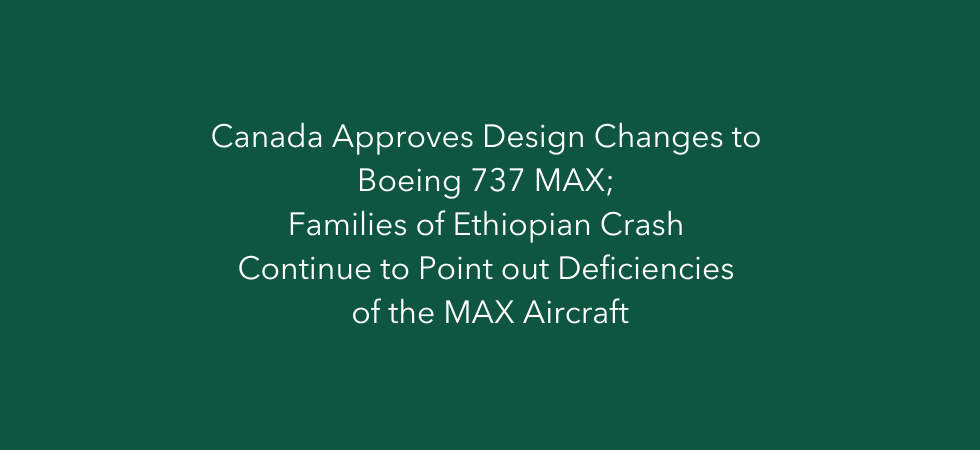The Transport Canada Civil Aviation (TCCA) announced on Thursday, 12/17/2020 that the approval of design changes to the Boeing 737 MAX in a first step toward bringing the aircraft back to that country’s skies after a near two-year flight ban. The 737 MAX was grounded in March 2019 following two tragic crashes of the new aircraft that killed 346 people due to defects in the plane’s design and other major deficiencies.
The Canadian regulator, however, did not issue an immediate airworthiness directive, which is needed to clear the way for the lifting of the ban on commercial flights of that Boeing aircraft. Canada was one of the last major nations before the U.S. to ground the MAX.
Families of those who lost loved ones in the crash of Ethiopian Airlines Flight 302 in March 2019 as it headed to Kenya still do not believe that the 737 MAX is a safe plane to fly because of the ill-conceived Maneuvering Characteristics Augmentation System (MCAS), a software added to the plane to try to correct its redesign deficiencies. Boeing officials never told pilots about this major change prior to it being approved for flight around the world.
Chris Moore, father of 24-year-old Danielle Moore, who was killed in the crash of ET 302, said, “Right now, I’m arguing on a position of logic and common sense. Although I’m skeptical the B737 MAX may meet regulations, but it doesn’t meet modern safety standards. The MCAS is an Achilles heel of the B737 MAX and, therefore, it will not match the success of the NG (Next Generation). It is a step backward for consumer product safety. The B737 MAX was ill-conceived, and the authorities have allowed the process of ungrounding it to occur.” NG is the previous iteration of the Boeing 737 jet.
Michael Stumo, who lost his 24-year-old daughter Samya Rose Stumo from Massachusetts in that crash, said, “When Boeing and aviation officials say this is the safest aircraft to fly the skies, they are lying to us. The 737 MAX 8 cannot meet airworthiness requirements without the MCAS software that crashed flight ET302. They may have made the software less glitchy, but we can’t be sure because they are keeping it secret. The fact is the MAX could not be certified as a new airplane because it is infected with antiquated systems developed in decades-old 737 versions, some of which have single points of failure that can cause crashes if they fail.”
Following the two crashes that occurred shortly after takeoff and within five months of each other, several countries have examined the aircraft and discovered that the MCAS system was flawed.
TCCA’s move today follows earlier announcements by the European Union Aviation Safety Agency (EASA) that regulates airworthiness as well as the U.S. Federal Aviation Administration (FAA), which lifted its own ban Nov. 18.
Canada’s two largest carriers Air Canada and privately held WestJet Airlines both fly the Boeing 737 MAX aircraft. Last week, Brazil became the world’s first airline to fly the Boeing 737 MAX commercially since the planes were grounded
For further information, please contact Clifford Law Offices Communications Partner Pamela Sakowicz Menaker at 847-721-0909 (cell).

